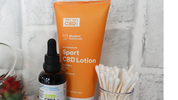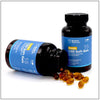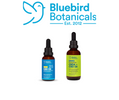CBD Extraction Methods Explained: How It’s Made Matters
Ever asked yourself the question, “how is CBD made?”. Understanding CBD extraction methods isn’t just for chemists; it’s also essential for everyday folks looking for clean, high-quality wellness products. Whether you're shopping for gummies, oils, or softgels, the way hemp oil is extracted plays a big role in product quality and safety.
Key Takeaways
-
Different extraction methods can affect the quality and safety of CBD products.
-
CO2 extraction is popular because it’s clean and efficient, giving you high-quality CBD.
-
Ethanol extraction is also common but can leave behind residual solvents if not done carefully.
-
Hydrocarbon extraction is less common and can be risky due to potential impurities.
-
Always check for information about residuals on product labels to ensure safety.
Why CBD Extraction Matters
As interest in CBD products continues to grow, more people are starting to ask smart questions like:
-
How is CBD made?
-
What’s the best CBD extraction method?
-
Does extraction impact quality or safety?
These are really good questions because extraction isn’t just about pulling CBD from hemp… It's about preserving purity, maximizing strength, and avoiding chemical leftovers. Today, a lot of people care about sustainability, transparency, and clean ingredients, and how CBD is made can reflect all of that.
What Is CBD Extraction?
CBD extraction is how we get CBD out of the hemp plant and into the products you use. Along the way, it also brings out other helpful compounds like cannabinoids, terpenes, flavonoids, and essential oils. The method used can affect how the final product tastes, how strong it is, how long it lasts, and how safe it is to use.
Common CBD Extraction Methods
CBD is typically pulled from hemp using one of several extraction techniques. These methods differ in complexity, cost, and results.
|
Method |
Solvent-Based? |
Popularity |
Key Pros |
Key Cons |
|
CO2 Extraction |
No |
Very High |
Clean, efficient, preserves cannabinoids |
Expensive machinery |
|
Ethanol Extraction |
Yes |
High |
Fast, scalable |
Risk of residual solvents if not purged |
|
Hydrocarbon |
Yes |
Low |
Powerful extraction of full plant matter |
Safety risks, not ideal for CBD |
|
Solvent-Free (Rosin) |
No |
Niche |
No chemicals used |
Small-scale, labor-intensive |
CO2 Extraction: The Clean Champion
CO2 extraction uses pressurized carbon dioxide in either supercritical or subcritical form to extract CBD. It’s often considered the gold standard in hemp oil production.
Benefits:
-
No chemical solvents involved
-
Precise control = higher purity
-
Preserves delicate compounds like terpenes
Fun Fact:
Supercritical CO2 behaves like both a gas and a liquid, allowing it to move through plant matter and pull out cannabinoids effectively without damaging them.
Scientific note: The Journal of Supercritical Fluids reports that supercritical CO2 provides better selectivity for CBD compared to other solvents, making it ideal for high-end products.
Ethanol Extraction: Fast but Tricky
Ethanol extraction uses food-grade alcohol to dissolve CBD from the hemp plant. It’s one of the oldest extraction methods and is still widely used today due to its cost-effectiveness.
Pros:
-
Efficient for full-spectrum and isolate extractions
-
Faster than CO2 for large volumes
Cons:
-
Requires winterization, which is a process to remove unwanted compounds
-
If not properly purged, may leave residual ethanol
This method is popular for CBD gummies and other edible formats due to its scalability. If not properly refined, ethanol-extracted CBD might retain small traces of alcohol, which some people prefer to avoid.
Hydrocarbon Extraction: Less Common for a Reason
Hydrocarbons like butane or propane can also extract CBD, but they’re mostly used in THC extraction for cannabis products.
Why It’s Not Ideal:
-
Flammable and high-risk
-
Can leave toxic residues if not thoroughly purged
-
Not preferred for wellness-focused CBD hemp oil production
Due to safety concerns, hydrocarbon extraction is not common in reputable CBD product manufacturing.
Solvent-Free vs Solvent-Based Extraction
Solvent-free extraction like rosin pressing uses heat and pressure to extract oil directly from the hemp plant. It’s chemical-free and appeals to purists, but it’s not ideal for mass production.
At a glance:
|
Approach |
Example Methods |
Pros |
Best For |
|
Solvent-Free |
Rosin, Cold Pressing |
Clean, pure, minimal processing |
Artisanal or small-batch brands |
|
Solvent-Based |
Ethanol, Hydrocarbon |
Efficient, scalable |
Large-scale production |
At Bluebird Botanicals, we use CO2 extraction for our flagship CBD oils because it’s clean, solvent-free, and preserves the full cannabinoid profile our customers love. We also use Ethanol extraction for some of our products.
What Are Residual Solvents and Why Should You Care?
Some CBD extraction methods might leave behind trace solvents if not done correctly. While reputable companies test for this, consumers should still check third-party lab reports (Certificates of Analysis or COAs).
Look for labels or site info that mention:
-
“Solvent-free”
-
“CO2-extracted”
-
“Lab-tested for purity”
Pro tip: Always check for the lab report, even if the label says “natural” or “pure.” Transparency is key!
Does Extraction Method Affect Product Type?
Understanding how CBD is made helps explain why some products work differently than others because extraction can affect absorption, taste, and more.
|
Product Type |
Best Extraction Method |
Why It Matters |
|
CBD Oils |
CO2 or Ethanol |
Purity and full-spectrum cannabinoid profile |
|
CBD Gummies |
Ethanol or CO2 |
Requires clean, refined extract |
|
CBD Capsules |
CO2 |
Consistency and strength |
|
CBD Topicals |
Varies |
Depends on base oils and active compounds |
Fun fact: Some people believe CO2-extracted oils taste smoother and work faster when taken sublingually.
Quick Recap: Key Takeaways for Shoppers
CO2 extraction = clean, high-quality, solvent-free
Ethanol extraction = good but depends on post-processing
Hydrocarbon = not ideal for safe CBD use
Solvent-free = pure but less scalable
Always check lab results for residual solvents and strength
What to Look for on Brand Websites
Before buying, savvy shoppers should:
-
Check if the site has any mention of how their CBD is made
-
Look for terms like CO2 extracted or ethanol extracted and lab-tested
-
Download or review the Certificate of Analysis
-
Read the ingredient list for added chemicals or mystery fillers
-
See if the company shares sustainability practices
If you're shopping on Amazon or other third-party sites, this information might not be as available, so it’s best to go directly to the brand’s website.
Want to see how quality CBD is made?
Check out our CBD product lineup and explore clean, lab-tested formulas made with your wellness in mind.
Quick answers to help you feel more confident:
Q: How is CBD made?
A: CBD is extracted from hemp using methods like CO2 extraction, ethanol extraction, or solvent-free techniques like rosin pressing.
Q: What’s the cleanest extraction method?
A: CO2 extraction is widely considered the safest and most chemical-free option used by reputable brands.
Q: Can CBD have solvent residue?
A: It can, especially if ethanol or hydrocarbon methods are used without proper refinement. Always check for third-party lab reports.
Q: Does the extraction method affect quality?
A: Yes. It can influence the product’s purity, taste, consistency, and how well it might work for you.
Q: Which method is best for gummies or oils?
A: Gummies often use ethanol or CO2-extracted CBD. Oils typically benefit from CO2 extraction for purity and safety.
Final Thoughts
With so many CBD extraction methods in play, knowing how CBD is made can help you make better choices whether you’re buying oils, gummies, or capsules. Understanding the difference between CO2 extraction vs ethanol or recognizing red flags like hydrocarbon use helps ensure you're getting a safe, effective product.
Save this article or share it with someone who’s just starting out. Better-informed shoppers = better CBD experiences.
Ready to make a more informed choice?
Browse our site to learn more about CBD, see how our products are extracted, and discover what makes Bluebird Botanicals trusted by thousands.
Frequently Asked Questions
What is CBD extraction?
CBD extraction is the process of taking CBD oil from the cannabis plant. This oil can be used in different products like gummies and oils.
Why does the extraction method matter?
The method used to extract CBD affects the quality and safety of the product. Some methods leave harmful chemicals, while others produce cleaner oil.
What are the common methods of CBD extraction?
The most common methods include CO2 extraction, ethanol extraction, and hydrocarbon extraction. Each has its own pros and cons.
What are residuals in CBD products?
Residuals are leftover chemicals from the extraction process. It's important to choose products with low or no residuals for safety.
How does extraction affect different CBD products?
The extraction method can change the taste, strength, and overall quality of CBD products like gummies, oils, and capsules.
Citations:
U.S. Hemp Authority Guidelines, 2023
FDA Consumer Updates on CBD, 2024
Disclaimer:
This article is for informational purposes only and is not intended to diagnose, treat, cure, or prevent any medical condition. The statements regarding CBD and sleep have not been evaluated by the Food and Drug Administration (FDA). Please consult with a healthcare professional before starting any new supplement.









